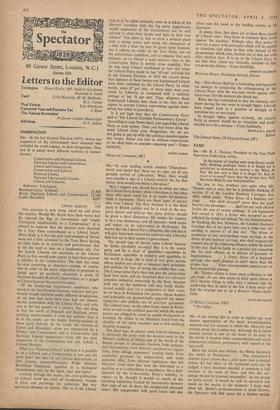TAXI!
SIR,—Mr. R. E. Thomas, President of the Taxi Fleet Operators Federation, writes : In the matter of tipping your contributor (wish-
fully thinking perhaps) states it is illegal fora cab-driver to demand or receive a tip. What, in fact, the law says is that it is illegal for him to exact or demand* more than the proper fare. Not the same thing by any interpretation.
The law, in fact, nowhere says quite what Mr. Thomas says it says; but he is probably thinking of section 33 of the London Hackney Carriages Act, 1843, which states: 'Every driver of a hackney car- riage . . . who shall demand* more than the legal fare for any passenger . . . shall for any such offence forfeit the sum of twenty shillings.' If cab legislation had ceased in 1843, a driver who accepted an un- solicited tip would not indeed, `by any interpretation,' be breaking the law. However, the London Hackney Carriage Act of ten years later cast a wider net, Ac- cording to section 17 of this Act : 'The driver or conductor of any metropolitan stage carriage, or the driver of any hackney carriage, who shall respectively commit any of the following offences within the limits of this Act, shall be liable to a penalty not exceeding 40s. for each offence, or in default of payment to imprisonment . . 1. Every driver of a hackney carriage who shall demand or take* more than the proper fare . . .' Your correspondent appears not to have sharked this passage.
Mr. Thomas claims to have spent a lifetime in the cab trade. As one who seems to have spent almost a life's income riding in cabs, may I console him by confessing that, in spite of the law, I have never yet had the courage not to tip a driver?—Yours faith- fully, * My italics.






























 Previous page
Previous page